 Your new post is loading...
 Your new post is loading...

|
Scooped by
Gust MEES
|
Theologie ( griechisch θεολογία theología, von θεός altgriechisch theós ‚Gott' und λόγος lógos ‚Wort, Rede, Lehre') bedeutet „die Lehre von Gott" oder Göttern im Allgemeinen und die Lehren vom Inhalt eines spezifischen religiösen Glaubens und seinen Glaubensdokumenten im Besonderen.
Kritik innerhalb der Theologie Kritik begleitet die ganze Kirchengeschichte, denn Auseinandersetzungen zwischen der etablierten Kirche und abweichenden Strömungen sind stets mit Kritik (an den Ansichten der anderen) verbunden. Daneben gibt es von Beginn an auch ein selbstkritisches Hinterfragen des eigenen Verständnisses. Paulus mahnte: „Prüft alles und behaltet das Gute!“ (1 Thess 5,21 EU), und verwies auf die Vorläufigkeit unseres jeweiligen Erkenntnisstandes („unser Erkennen ist Stückwerk …“ 1 Kor 13,9.12 EU). Gegenwärtig betonen theologische Lexika die kritische Aufgabe der Theologie. [2] Für Heinzpeter Hempelmann ist Kritik „die einzig angemessene Antwort auf (einen) Offenbarungsanspruch“, denn die Spuren eines die menschliche Vernunft derart in Frage stellenden Ereignisses wie die Menschwerdung Gottes seien „unterscheidend und prüfend“ wahrzunehmen.[3] Das Thema Kritik im Bereich der christlichen Religion behandelt Franz Graf-Stuhlhofer grundsätzlich im Buch Christliche Bücher kritisch lesen[4] sowie in der Studie Facetten kritischen Denkens.[5] Learn more / En savoir plus / Mehr erfahren: https://www.scoop.it/t/21st-century-learning-and-teaching?tag=Critical-Thinking

|
Scooped by
Gust MEES
|
We see a post on social media, read an article in the paper, listen to opinions in a meeting, hear the results of a poll, and before you know it, we adjust our views and jump on the bandwagon with everyone else. It’s as if we say, “If it’s good enough for them, it’s good enough for me.” No questions asked. Groupthink: what makes you think others know better?
We are dramatically affected by the people around us. In fact, we tend to do things simply because others do them, rather than follow our own beliefs or think for ourselves. That’s fine if we’re kind, eat healthy, or read more because our friends and colleagues influence us to act that way. But this phenomenon can also compel us to do things against our own best interest — if we’re not careful.
Even though being part of a group provides comfort and security it doesn’t guarantee that your group will always think intelligently; in fact, their reasoning may be deeply flawed. That’s why you should think carefully before you end up destroying your credibility and your reputation. It’s important to consider whether the messenger is credible, the information is accurate, the rationale is logical, and the intentions are honorable. The alternative is to follow the group blindly — and assume that other members did their homework.
When your ears hear one thing, but your eyes see another…use your brain. Learn more / En savoir plus / Mehr erfahren: https://www.scoop.it/t/21st-century-learning-and-teaching?tag=Critical-Thinking https://www.scoop.it/t/21st-century-learning-and-teaching/?&tag=Frank+SONNENBERG

|
Scooped by
Gust MEES
|
Being Conscious About Our Unconscious Biases
I attended a very interesting workshop a few weeks ago on the topic of “Unconscious Bias” facilitated by Smita Tharoor. I was interested in this topic because I explored the intersection of critical thinking and leadership a few years ago. This was a good opportunity to get back to the topic and add to my understanding.
What is Unconscious Bias
The term ‘cognitive bias’ was coined by Amos Tversky and Daniel Kahneman in 1972 which quite simply means “our tendency to filter information, process facts and arrive at judgments based on our past experiences, likes/dislikes and automatic influences.”
How do these biases show up in Leadership?
A lot of leadership is about taking decisions involving group of people. Instinctive leaders often tend to decide quickly based on limited information or experience they have at hand. The result is that they end up taking wrong decisions (which may have worked for them in past but may not work in a different context), or discriminating with people of a certain color, race, sex or nationality based on their past experiences with similar people. At work, biases (or the perception of bias) is the biggest contributor to people disengagement and cost of disengagement is huge. Lack of critical thinking also leads to short-termism where decisions are taken for immediate gains and solutions of today become thorny problems of tomorrow.
============================================== Look for the contrary. It helps playing a devil’s advocate and taking a contrarian view of things. It not only challenges others to think harder but also helps you in really understanding if they are just defending their own biases. ============================================== In common parlance, a devil's advocate is someone who, given a certain argument, takes a position they do not necessarily agree with (or simply an alternative position from the accepted norm), for the sake of debate or to explore the thought further. ============================================== Learn more / En savoir plus / Mehr erfahren: https://www.scoop.it/t/21st-century-learning-and-teaching/?&tag=LeaderShip https://www.scoop.it/t/21st-century-learning-and-teaching/?&tag=Devil%27s+advocate

|
Scooped by
Gust MEES
|
Critical Thinking AND Proactive Thinking a MUST in Modern-EDU! WHY!? Looks to me as WE will live THE same as in 50's-60's with "James DEAN", Living on the edge Youth & Society", overload of information!? Change? At that time period it was TV, NOW it's the internet, similarities? Well, I think so!! A… Learn more / En savoir plus / Mehr erfahren: http://www.scoop.it/t/21st-century-learning-and-teaching/?&tag=Gust-MEES

|
Scooped by
Gust MEES
|

|
Scooped by
Gust MEES
|
Im Netz gibt es sie wie Sand am Meer: Gefälschte und manipulierte Bilder, die mit Bildbearbeitungsprogrammen verändert wurden. Meist sollen sie nur für Lacher sorgen – manchmal fallen auch berühmte Persönlichkeiten auf diese „Shoops“ (benannt nach der beliebten Software „Photoshop“) herein, zur allgemeinen Belustigung. Überhaupt nicht lustig sind solche Fälle, in denen Fotomontage verwendet wird, um mit politischen Absichten einen falschen Eindruck zu wecken. So teilte die deutsche Politikerin Erika Steinbach ein Bild, das die „Refugees Welcome“-Bewegung verunglimpfte. Nach den Events in Charlottesville in den USA teilte ein Journalist ein Bild, das einen der rechtsnationalen Protestler gemeinsam mit US-Präsident Trump zeigt – ebenfalls eine Fälschung. In beiden Fällen wurden die Bilder tausendfach geteilt; definitiv keine kleine Sache, findet Georges Knell von BEE Secure.
„Durch solche ,Fakes‘ lässt sich besonders leicht ein falsches Bild über bestimmte Personen oder bestimmte Gruppen von Personen verbreiten, besonders, wenn diese in einem negativen Kontext dargestellt werden. Oft ist es auch so, dass solche ,Fakes‘ öfter verbreitet werden, wenn sie in das Weltbild der bestimmten Person passen oder ihre Meinung über eine bestimmte Person respektiv über eine bestimmte Gruppe von Personen bestätigen. In solchen Fällen wird besonders schnell und ohne weiteres Nachfragen geteilt; das ist aber keineswegs nur ein Kavaliersdelikt, denn in den meisten Fällen verteilt sich der Inhalt damit wie ein Lauffeuer, während sich für eine eventuelle Richtigstellung meistens niemand mehr interessiert – so entsteht allzu schnell eine emotional aufgeladene Diskussion, die sich in einem Sturm der Entrüstung entlädt.
Durch Liken und Teilen in sozialen Netzwerken entsteht dabei eine Art Schneeballeffekt: Immer mehr Menschen bekommen Wind von der Kritik und hinterlassen ebenfalls Kommentare. Rationale Argumente haben dann oft keinen Platz in der Diskussion mehr. Learn more / En savoir plus / Mehr erfahren: https://www.bee-secure.lu/ http://www.scoop.it/t/21st-century-learning-and-teaching/?&tag=No+Hate+Speech

|
Scooped by
Gust MEES
|

|
Scooped by
Gust MEES
|

|
Scooped by
Gust MEES
|

|
Scooped by
Gust MEES
|
Critical Thinking and Students
Designing instruction that fosters critical thinking skills is a necessary part of our instructional process. We must make sure to proactively differentiate the learning to guide our students through a variety of levels of understanding.
Bloom’s Taxonomy has stood the test of time to empower our own thinking and reflective practices. Specifically the revised taxonomy and questioning techniques continue to guide teachers to evolve with the times to support learning through carefully designing and meaningful active learning for everyone.
Check out Literacy is Not Enough to think about applying the important skills of problem solving, creativity, collaboration, analytical thinking, ethics, action, and accountability (Crockett, Jukes, & Churches, 2011).
Now let’s make a shift. Think about how critical thinking skills could transform the process of co-teaching!
Let’s take a few mindful moments to realize the opportunities for your own critical thinking evolution.
Learn more / En savoir plus / Mehr erfahren: http://www.scoop.it/t/21st-century-learning-and-teaching/?tag=Team-Teaching http://www.scoop.it/t/21st-century-learning-and-teaching?tag=Critical-Thinking
Teachers should embrace a radical pedagogy and provoke students to demand equality for themselves and others, argues vice principal Tait Coles Schools must develop a commitment to civic courage and social responsibility that ignites bravery in young people to realise they have the power and opportunity to challenge the status quo. School leaders have a duty to promote learning that encourage students to question rather than forcing teachers to lead drill-oriented, stimulus-and-response methodologies. Teachers must awaken the passions of their students and teach the knowledge and skills needed to direct and sustain it. Students need the freedom and encouragement to determine and discover who they are and to understand that the system shouldn't define them – but rather give them the skills, knowledge and beliefs to understand that they can set the agenda. Educators must be prepared to embrace a radical pedagogy and believe that each school should be one of freedom that provokes students to fight against the corridors of power and enforce equality for themselves and others. Critical pedagogy is the only way to achieve this. The philosophy was first described by Paulo Freire and has since been developed by the likes of Henry Giroux, Peter McLaren and Roger Simon. Critical pedagogy isn't a prescriptive set of practices – it's a continuous moral project that enables young people to develop a social awareness of freedom. This pedagogy connects classroom learning with the experiences, histories and resources that every student brings to their school. It allows students to understand that with knowledge comes power; the power that can enable young people to do something differently in their moment in time and take positive and constructive action. Learn more / En savoir plus / Mehr erfahren: http://www.scoop.it/t/21st-century-learning-and-teaching/?tag=Radical+Pedagogy
Via Nik Peachey
Cross-curricular? Critical thinking? How do these rather different educational concepts work together, and why should we want them to be a part of our teaching practice? Let’s start with critical thinking, a skill we must consider to be a fundamental goal in all of our work as educators. President Obama publically identified critical thinking as a crucial 21st-century skill that learners of all ages need to master to be successful in both the educational arena and the ever-evolving global economy. Adding in the advice of old John Dewey, we see how learning experiences that stimulate thinking by having students engage in creating meaning out of a variety of facts, scenarios, and variables (rather than just memorizing a single, linear timeline or algorithm with no context or supportive background) puts the learner in the center of the learning process. By using online tools to bring in multiple related concepts from across disciplines, we make the learning more authentic. Learn more / En savoir plus / Mehr erfahren: http://www.scoop.it/t/21st-century-learning-and-teaching/?tag=John+DEWEY http://www.scoop.it/t/21st-century-learning-and-teaching/?tag=Critical-Thinking
Via Edumorfosis
|

|
Scooped by
Gust MEES
|
Eine Suggestivfrage ist eine Frageform, bei der der Befragte durch die Art und Weise der Fragestellung beeinflusst wird, eine Antwort mit vorbestimmtem Aussageinhalt zu geben, die der Fragesteller erwartet. Die Art und Weise der Frage hat den Zweck, auf das Denken, Fühlen, Wollen oder Handeln einer Person einzuwirken und den Befragten von einer rational bestimmten Antwort abzuhalten.
Eine Suggestivfrage ist eine Frageform, bei der der Befragte durch die Art und Weise der Fragestellung beeinflusst wird, eine Antwort mit vorbestimmtem Aussageinhalt zu geben, die der Fragesteller erwartet. Die Art und Weise der Frage hat den Zweck, auf das Denken, Fühlen, Wollen oder Handeln einer Person einzuwirken und den Befragten von einer rational bestimmten Antwort abzuhalten.
Suggestivfragen finden in der Psychologie, in der Rhetorik, in der Vernehmungspraxis, im Verkaufsgespräch, in der Markt- und Meinungsforschung sowie im alltäglichen Sprachgebrauch Anwendung, werden jedoch aufgrund ihres Beeinflussungscharakters nicht geschätzt.
Wer diese Frageform anwendet, stellt keine wirkliche Frage, sondern beabsichtigt, seine Idee, Sicht oder Meinung einer anderen Person zu suggerieren, um beeinflussend zu wirken.
Nützlich kann eine Suggestivfrage dann sein, wenn sie eine vorhandene Gemeinsamkeit im Denken, Fühlen, Wollen oder Handeln mit einer Person betonen soll. Learn more / En savoir plus / Mehr erfahren: https://www.scoop.it/t/21st-century-learning-and-teaching?tag=Critical-Thinking

|
Scooped by
Gust MEES
|
Education may be the passport to the future, but for all the good teaching out there, it would seem that schools are failing to impart some of the most important life skills, according to one educational expert.
Dr. Tony Wagner, co-director of Harvard's Change Leadership Group, argues that today’s school children are facing a “global achievement gap”, which is the gap between what even the best schools are teaching and the skills young people need to learn.
This has been exacerbated by two colliding trends: firstly, the global shift from an industrial economy to a knowledge economy, and secondly, the way in which today’s school children – brought up with the internet – are motivated to learn.
In his book The Global Achievement Gap, Wagner identifies seven core competencies every child needs in order to survive in the coming world of work.
1. Critical thinking and problem-solving 2. Collaboration across networks and leading by influence 3. Agility and adaptability 4. Initiative and entrepreneurialism 5. Effective oral and written communication 6. Accessing and analysing information

|
Scooped by
Gust MEES
|
Preparing a child for the world that doesn’t yet exist is not an easy task for any teacher. Step back and look at that picture from a broad perspective. What are the critical 21st-century skills every learner needs to survive and succeed in our world? What abilities and traits will serve them in a time that’s changing and developing so rapidly?
They want to be challenged and inspired in their learning. They want to collaborate and work with their peers. They want to incorporate the technology they love into their classroom experiences as much as they can. In short, they have just as high a set of expectations of their educators as their educators have of them.
How Are Educators Responding?
The Australian Curriculum Assessment and Reporting Authority, (ACARA), have identified the following as the General Capabilities they see as essential for learners:
Critical and creative thinking
Personal and social capability
Ethical understanding
Intercultural understanding
Information and communication technology capability
Literacy
Numeracy
Learn more / En savoir plus / Mehr erfahren. http://www.scoop.it/t/21st-century-learning-and-teaching/?&tag=modern-education

|
Scooped by
Gust MEES
|
We all probably know someone who is very intelligent, but does blatantly stupid things. Despite evidence that intelligence predicts a variety of life outcomes, the relationship between intelligence and good thinking is less clear. This research explored whether critical thinking ability or intelligence was the better predictor of real life events. Community adults and college students (n = 244) completed a critical thinking assessment, an intelligence test, and an inventory of life events. Individuals with higher critical thinking scores and higher IQs reported fewer negative life events. Critical thinking more strongly predicted life events than intelligence and significantly added to the variance explained by IQ. There is ample evidence that critical thinking can be taught, so there is hope that teaching critical thinking skills might prevent the occurrence of negative life events. We advocate for critical thinking instruction as a way to create a better future for everyone. Learn more / En savoir plus / Mehr erfahren: http://www.scoop.it/t/21st-century-learning-and-teaching?tag=Critical-Thinking http://www.scoop.it/t/21st-century-learning-and-teaching/?&tag=Soft+Skills

|
Scooped by
Gust MEES
|

|
Scooped by
Gust MEES
|
We are becoming increasingly aware of the need to analyze the enormous amount of information we receive every day. This information helps us in our cognitive development and participates in the construction of our patterns of perception of reality. In the case of children and young people, these patterns are in continual development. Critical thought is a cognitive process that proposes the systematic analysis of information, opinion and statements that we accept in our daily life as valid or true. It is a basic skill for a competent, free and responsible citizen. It is not about questioning every information we get everyday, it is about being critical with the information that is relevant to us when we make up an opinion about something.
Learn more / En savoir plus / Mehr erfahren: http://www.scoop.it/t/21st-century-learning-and-teaching?tag=Critical-Thinking

|
Scooped by
Gust MEES
|

|
Scooped by
Gust MEES
|
As the world economy shifts away from manufacturing jobs and towards service industry and creative jobs, there’s a consensus among parents, educators, politicians and business leaders that it is crucial students graduate into university or the workforce with the ability to identify and solve complex problems, think critically about information, work effectively in teams and communicate clearly about their thinking. Originally developed by Rotman’s former dean, Roger Martin, integrative thinking is a broad term to describe looking for solutions through the tensions inherent in different viewpoints. Martin noticed that effective CEOs understood that their own world view was limited, so they sought out opposing viewpoints and came to creative solutions by leveraging seemingly opposing positions. For the past seven years, a spin-off group called the I-Think Initiative has been training teachers in the Toronto area on how integrative thinking can build critical thinking in students from a young age. Learn more / En savoir plus / Mehr erfahren: http://www.scoop.it/t/21st-century-learning-and-teaching?tag=Critical-Thinking
Via Nik Peachey, Ana Pérez Escoda

|
Scooped by
Gust MEES
|
L'esprit critique est une dynamique. Ce n'est jamais un acquis définitif, et il peut toujours nous arriver d'en manquer, d'être entraîné par nos opinions, par nos préjugés, de laisser de côté des aspects de la réalité qui nous gênent ou nous remettent en question. Le sociologue Max Weber, dans un ouvrage célèbre, Le savant et le politique, écrit : « La tâche primordiale d'un professeur capable est d'apprendre à ses élèves à reconnaître qu'il y a des faits inconfortables, j'entends par là des faits qui sont désagréables à l'opinion personnelle d'un individu ; en effet il existe des faits extrêmement désagréables pour chaque opinion, y compris la mienne » (Max Weber, Le Savant et le politique). On ne peut donc pas se prévaloir purement et simplement de l'esprit critique : on s'efforce d'en avoir, et cela se traduit par des pratiques. C'est à cet effort incessant que l'enseignant initie progressivement ses élèves. Learn more / En savoir plus / Mehr erfahren: http://www.scoop.it/t/21st-century-learning-and-teaching?tag=Critical-Thinking
|




 Your new post is loading...
Your new post is loading...




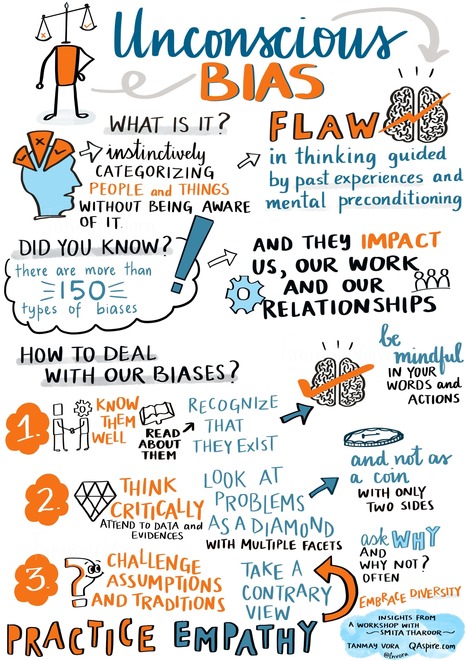
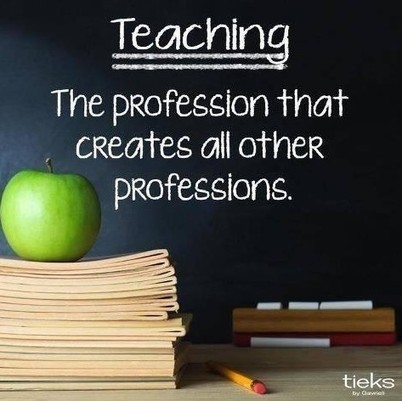
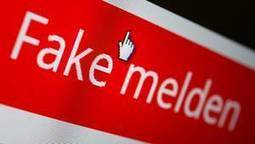

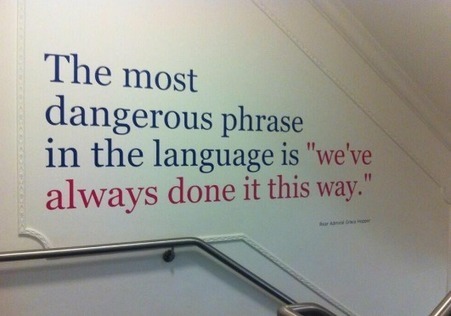
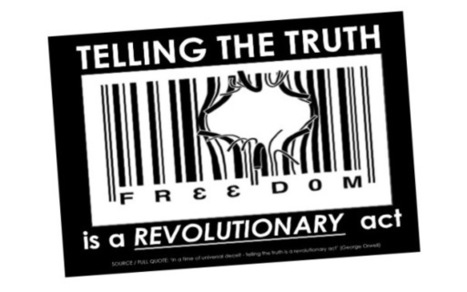
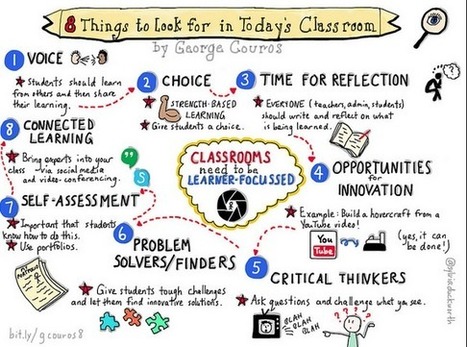

![The Critical Thinking Skills Cheatsheet [Infographic] | #LEARNing2LEARN | 21st Century Learning and Teaching | Scoop.it](https://img.scoop.it/sxh5AIjI1PEa9kmMwj3gGjl72eJkfbmt4t8yenImKBVvK0kTmF0xjctABnaLJIm9)


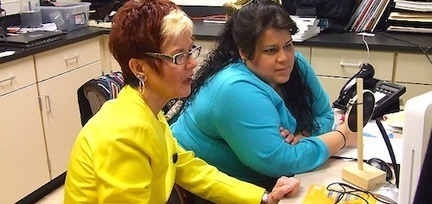



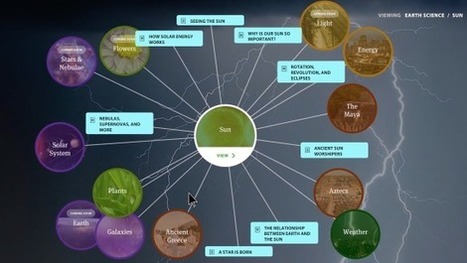




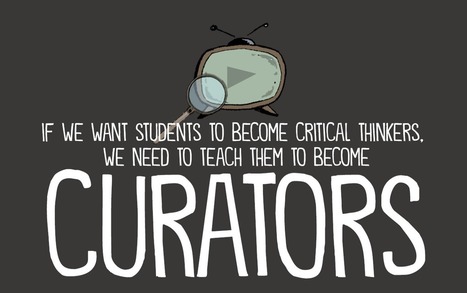



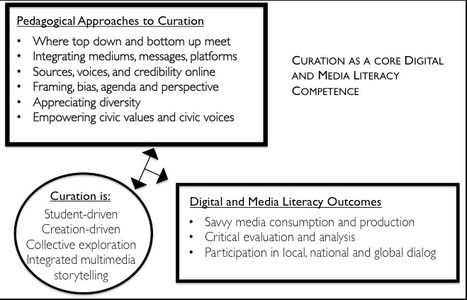


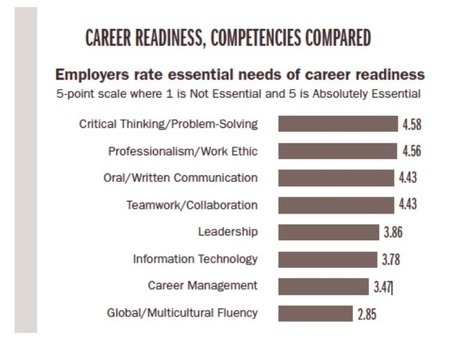

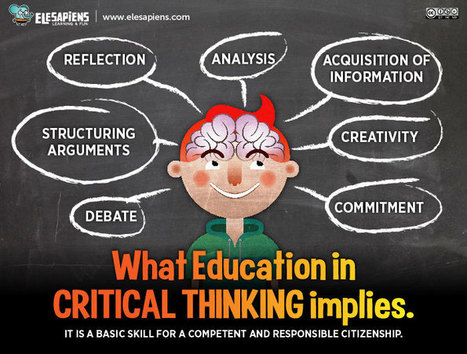
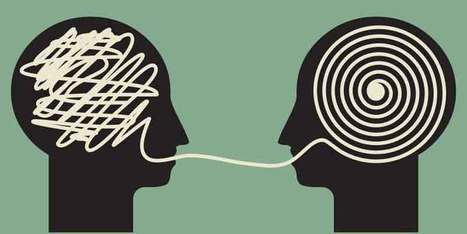


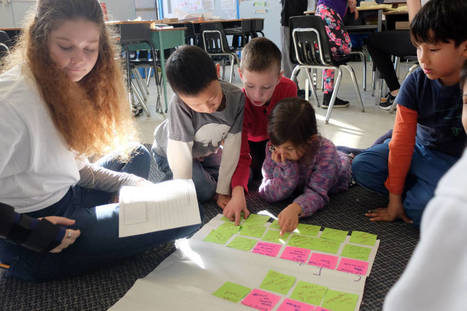


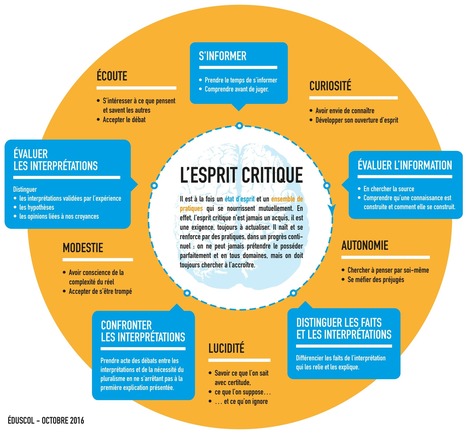





Kritik innerhalb der Theologie
Kritik begleitet die ganze Kirchengeschichte, denn Auseinandersetzungen zwischen der etablierten Kirche und abweichenden Strömungen sind stets mit Kritik (an den Ansichten der anderen) verbunden. Daneben gibt es von Beginn an auch ein selbstkritisches Hinterfragen des eigenen Verständnisses. Paulus mahnte: „Prüft alles und behaltet das Gute!“ (1 Thess 5,21 EU), und verwies auf die Vorläufigkeit unseres jeweiligen Erkenntnisstandes („unser Erkennen ist Stückwerk …“ 1 Kor 13,9.12 EU). Gegenwärtig betonen theologische Lexika die kritische Aufgabe der Theologie.
[2] Für Heinzpeter Hempelmann ist Kritik „die einzig angemessene Antwort auf (einen) Offenbarungsanspruch“, denn die Spuren eines die menschliche Vernunft derart in Frage stellenden Ereignisses wie die Menschwerdung Gottes seien „unterscheidend und prüfend“ wahrzunehmen.[3] Das Thema Kritik im Bereich der christlichen Religion behandelt Franz Graf-Stuhlhofer grundsätzlich im Buch Christliche Bücher kritisch lesen[4] sowie in der Studie Facetten kritischen Denkens.[5]
Learn more / En savoir plus / Mehr erfahren:
https://www.scoop.it/t/21st-century-learning-and-teaching?tag=Critical-Thinking